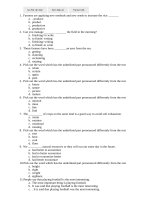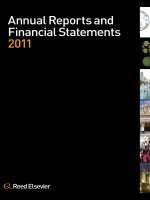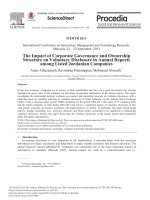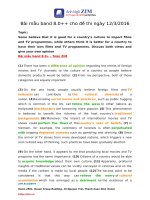Annual reports 12 03
Bạn đang xem bản rút gọn của tài liệu. Xem và tải ngay bản đầy đủ của tài liệu tại đây (142.23 KB, 2 trang )
A MARKETING TOOL
The annual report is one of your most
important public documents. It represents
your organization’s identity. It is also one of
your most effective marketing tools – for your
membership, potential investors, and the
community your organization serves. It tells
people who you are, and what your
organization is doing. It shows that your
organization is accountable for its programs
and finances. It is designed to make those who
gave money proud they did, and make them
want to give again.
The annual report is also a vital source of
information when applying for grants and
requesting contributions from major
corporations and foundations. In fact, many
government agencies, corporations and
philanthropic organizations require an annual
report when considering applications for
assistance or contributions.
COMPONENTS AND FORMAT
Annual reports serve as an overview of your
organization – its purpose, goals and major
accomplishments. Special programs may be
highlighted, and accentuated with statistical
graphs and photographs. Financial information
should be presented in a concise and easy-tounderstand manner. Officers and key staff
should be introduced, along with contact
information for the organization.
The components and formats of annual reports
vary widely, but they generally include the
following sections:
Introduction: A general statement of your
organization’s mission or purpose serves as the
foundation upon which the report is built.
This informs the reader of the importance of
your work and is meant to invoke feelings of
agreement and support.
Summary Report: This could be a letter
from the chief executive officer, president of
the board of directors, or other top-level
officer or staff member. The most effective
message will reflect on recent
accomplishments as they relate to the
organization’s direction and goals. Using top
management gives credibility to both the
editorial and financial contents. It also
underscores the importance of the publication.
Board Members, Staff, Donors: Name
your board members and staff, include their
titles and positions, and use photographs if
your budget allows. Some reports include a
brief biographical sketch of board members
and officers. List donors in alphabetical order,
preferably with no categories or amounts
given. You may want to acknowledge your
principal benefactors, but you don’t want to
alienate your rank-and-file supporters.
Program Description: This is the bulk of
your report. Give a program-by-program
description of your organization’s work and
progress for the previous year. Highlight your
successes, and, to the extent they are resolved,
report any problems encountered during the
year. Keep the information interesting, but
keep descriptions brief. Use subheads to
introduce each activity and break up the copy.
Readability is the key!
Plans for Upcoming Year: This is where
you discuss how you will maintain and
improve programs, and your plans for changes
in direction or strategy. You may want to
include supportive documentation that defends
or justifies the leadership’s decision-making.
Financial Information: Accurate
financial data is crucial. This should include a
statement of income and expenses, reported by
category. If you have an audit, those are the
figures you should use. If there are unusually
high expenses, explain them in footnotes.
Financial data can be presented in formats
ranging from a simple pie chart to narratives
and extensive graphs for each department.
Simplicity works best.
Public Policy: Community-based
organizations and their programs are directly
impacted by public policy, and you need to be
involved in shaping local strategies and action
plans. Report on your involvement in helping
shape public policy, meetings with legislators
and government officials, and development of
ordinances that enhance your organization’s
effectiveness. Members need to know you
were behind the scenes advancing the issues.
■ Integrity of Voice: You want to put the
organization’s best foot forward, but avoid
excluding important information – even if that
points to your weak spots. If you had an
excellent year, toot your horn, but not to the
point that it will make subsequent modest
years look like disappointments.
■ Time Frame: Writing an annual report
doesn’t have to be hard or time consuming.
Scheduling and writing the report during a
two-month period makes more sense that
jamming it into a weekend. Two months
before year-end, decide who will write each
section and assign deadlines. Most of the
information should be drawn from reports,
minutes of board meetings, and grant reports
to funders. Remember, the key is simplicity.
If your report looks too complicated, your
audience may put it aside and never pick it up
again.
COMPOSITION TIPS
Text: Annual reports are usually designed
with a lot of “white space” to make them easy
to read. Using wide margins and gutters
(space between columns), placing spaces
between paragraphs, aligning your text to the
left and using “ragged right” will open up the
copy. These techniques were all used in
producing this brochure. The editorial tone
should be formal, yet personalized with the use
of first person and possessive pronouns.
Sections should be clearly identified with
distinctive heads, but avoid using too many
type styles and text gimmicks. These quickly
become distractions and make your report
appear less professional.
Photographs: Including photographs in an
annual report can be a lot of work and will add
considerably to your production costs. When
you seek quotes from printers, get numbers for
text only; text with black and white photos;
and text with color photos. If the cost with
photos is prohibitive, consider using
illustrations (clip art) to dress up your report.
These will add to visual interest without
impacting cost.
If you don’t have the budget to hire a
photographer, pictures taken by your
membership will work well. Use regular color
print film, not black and white film. It is less
expensive to buy, cheaper to develop, and can
be used even if your report calls for black and
white photos.
To add interest, use human interest or “action”
shots, showing interaction between staff and
the people with whom your organization
works. Human interest photos provide an
incentive for people to read the accompanying
copy. You may also use posed photographs –
people receiving awards, board members being
sworn in, group shots. Whatever you choose,
keep pictures to a minimum, and select only
photos that are in clear, sharp focus. Each time
a photo is reproduced, it loses clarity. If you
start with anything less than a clear, sharp
image, you will not like the finished product.
If you are a state or regional organization,
show members in various geographic
locations. Select photos that reflect the
diversity of your organization. Remember,
your goal is to represent your entire
community.
.
Creating an
Annual
Report
.
.
ADDITIONAL TIPS
■ Use annual reports from other organizations
to assist you in picking styles and formats.
■ Discuss layouts and styles with a printer to
help determine what you can afford. The
cost of your publication will be impacted by:
• Type and weight of paper used.
• Color of ink used – the more colors, the
higher the cost.
• Photographs – printing in color is more
expensive than black and white or duotone.
• Number of copies – make sure you order
enough for your board of directors, staff,
members, contributors (financial and inkind), grant and donation solicitations,
and targeted community distribution.
■ Have the board chair or designee review the
document prior to publication. This may
help avoid potential conflicts over tone and
style.
■ Publication timing should be as soon after
your organization’s fiscal year-end as
possible.
®
NATIONAL
COALITION
for
HOMELESS
VETERANS
333 ½ Pennsylvania Ave., SE
Washington, DC 20003-1148
Phone (202) 546-1969/Fax (202) 546-2063
Toll Free: 800 VET-HELP
Fax 888 233-8582
Email:
Web site:









